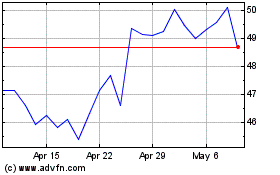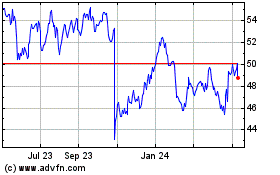By Preetika Rana
MANILA -- Lawmakers in the Philippines are scrutinizing
government decisions to pursue the wide-scale introduction of the
world's first dengue vaccine despite objections from state experts,
and continue its use after a subsequent warning from the World
Health Organization.
Former President Benigno Aquino III's administration launched
the vaccination drive in April 2016 with the goal of immunizing one
million children against dengue, which is caused by a
mosquito-borne virus. The potentially fatal disease can cause
fever, headaches, joint pain and possibly internal bleeding.
In a congressional hearing on Thursday, Mr. Aquino told
lawmakers that he had seen the disease as a significant enough
problem in his country that he met with executives from French
pharmaceutical maker Sanofi SA two times before his government
approved its vaccine, Dengvaxia.
The government drive proceeded against the wishes of an advisory
panel of doctors at the Department of Health, which raised concern
over the lack of long-term safety data for the vaccine.
In the 20 months that followed the launch of the drive, the
Philippines vaccinated over 800,000 children.
President Rodrigo Duterte's administration picked up the program
after he took office at the end of June 2016.
The WHO said the following month that the vaccine could expose
people previously uninfected with dengue to an elevated risk of
severe dengue, the potentially lethal form of the virus.
The government found in late 2016 that there were unspecified
"adverse events following immunization" in the five months leading
up to Aug. 20, 2016, for at least 997 children out of more than
400,000 who had received a dose in that period, according to a
document prepared for the congressional investigation and reviewed
by The Wall Street Journal.
The document said that at least 30 of those children were
hospitalized because of "serious illnesses" and at least two died.
The two deaths weren't attributed to dengue. It hasn't been
established that the Dengvaxia inoculation resulted in any cases of
severe dengue or deaths in the Philippines.
Sanofi said last month that after additional analysis it had
determined that the vaccine isn't suitable for people who hadn't
been infected previously with dengue. For those people, "more cases
of severe disease could occur" if they receive the vaccine and
later contract the virus, the company said.
Lawmakers last week began questioning former and current
officials, doctors, public-health experts and Sanofi executives in
an effort to determine, among other things, why Manila didn't
suspend the program until this month.
Sanofi said the vaccine is still effective for people who have
previously contracted dengue. Dengvaxia, a live-virus vaccine, is
administered in three doses, taken six months apart, and gains in
effectiveness with each successive dose, the company said;
effectiveness also varies against each of the four strains of
dengue, according to Sanofi.
The Philippines didn't test for previous dengue infection as
part of the vaccination program, according to the document prepared
for the congressional investigation.
Mr. Aquino told lawmakers on Thursday that he acted in good
faith when deciding to use the vaccine in a mass drive, and that no
concerns had been raised directly with him.
President Duterte said he welcomed the investigation by
Congress. "If there is a failure, let them sort it out," he said
Wednesday.
The Philippines was the first country to launch a mass
immunization drive using Dengvaxia. The vaccine has been introduced
in 10 other countries, but the only other one to use it for mass
immunization is Brazil, where it has been confined to Paraná, a
state hit hard by dengue epidemics in recent years.
No serious side effects have been reported there, said a
spokeswoman for the state, who said prior exposure to dengue was
prevalent in the region.
The dengue virus infects 390 million people globally every year
and kills tens of thousands, according to the WHO. More than
200,000 people contracted dengue in the Philippines last year.
For 10-year-old Christine Mae de Guzman, her symptoms began with
a throbbing headache one day in October 2016, according to her
parents. Within days she had died, succumbing to severe dengue,
according to a medical record reviewed by the Journal.
Her mother, Marivic de Guzman, said she couldn't understand why
her daughter got the disease because Christine had received a dose
of Dengvaxia earlier that year and had no prior history of the
virus. Christine died shortly before she was due to get her second
dose.
Christine's school in the province of Bataan, about 80 miles
northwest of Manila, had been among the first to take part in the
immunization drive.
"Of course we approved of it," said Christine's father, Nelson
de Guzman. "It was for her health."
Sanofi said it wasn't in a position to comment on Christine's
case because it hadn't been reported to the company. The company
said its studies showed it takes three years for any increased risk
to surface after the first shot. Christine died six months after
receiving hers.
The Department of Health said it plans to sue Sanofi and demand
a refund for the roughly $70 million it says it spent to buy the
vaccine. It said it wants Sanofi to cover medical costs associated
with any future hospitalizations.
A Sanofi spokesman said the drugmaker hasn't received legal
notice from the government.
--Aricel Saludo-Garcia in Manila and Paulo Trevisani in Brasília
contributed to this article.
Write to Preetika Rana at preetika.rana@wsj.com
(END) Dow Jones Newswires
December 17, 2017 20:23 ET (01:23 GMT)
Copyright (c) 2017 Dow Jones & Company, Inc.
Sanofi (NASDAQ:SNY)
Historical Stock Chart
From Mar 2024 to Apr 2024

Sanofi (NASDAQ:SNY)
Historical Stock Chart
From Apr 2023 to Apr 2024
